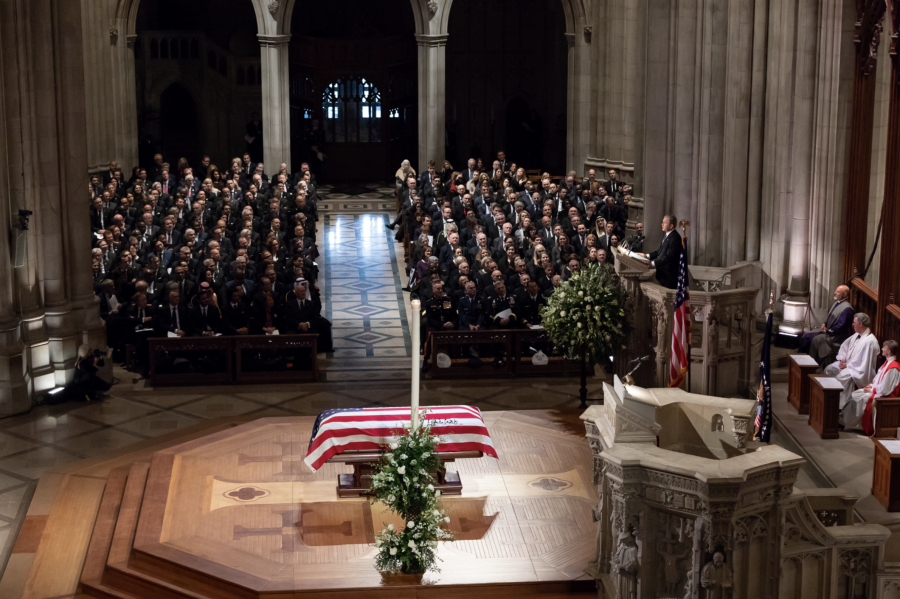I’m always in awe when the sitting president and all living former presidents gather. It resonates with me: seeing decades of American leadership and accomplishment represented in one place. That feeling returned when I watched parts of the Dec. 5 state funeral of President George H.W. Bush at Washington National Cathedral. I was most taken aback, however, when I saw Vanderbilt Distinguished Visiting Professor Jon Meacham, who wrote a landmark biography of Bush, deliver a eulogy at the service.
In his speech, Meacham placed Bush in a class of revered presidents: with George Washington, Theodore Roosevelt, Dwight D. Eisenhower and others for believing in “causes larger than themselves.” During Bush’s term, the Soviet Union collapsed, the Berlin Wall toppled and Kuwait was liberated from Saddam Hussein. From his service in the Navy, Bush embodied valor and proud defense of democracy, something all Americans can appreciate.
Bush also signed the landmark American with Disabilities Act in 1990, expanding protections for the disabled despite opposition from religious and business groups, and despite a divided government.
Alan Simpson, a former Senator and another eulogist at the state funeral, also spoke to Bush’s loyalty to a higher calling as president. He said in the service that, in 1990, when Bush signed a landmark budget that contradicted his famous campaign promise of “read my lips: no new taxes,” Bush said: “When the really tough choices come, it’s the country, not me. It’s not about Democrats or Republicans, it’s for our country that I fought for.”
The eulogists also described Bush in more personal terms. Meacham spoke of Bush’s “big, vibrant, all-enveloping heart.” He always offered “an outstretched hand, a warm word, a sympathetic tear” in times of need. In Simpson’s speech, he recalled a time when Bush, then Vice President under Ronald Reagan, took a trip with Simpson to Camp David to offer him support when his approval in the Senate was suffering. As Bush had said regarding the decision, “There were staff who told me not to do this, Al, but Al, this is about friendship and loyalty.” Bush was, for Simpson and so many others, “always, always, always a friend to his friends.” When politics are so volatile that many of us avoid talking about it with friends or family, Bush’s example reminds us what is always more important than our political loyalties: our support of those we love.
Inevitably, not all recent remarks after Bush’s passing have been positive, and one is worth addressing: a Dec. 6 Hustler opinion article criticizing him for running a “deeply racist” 1988 presidential campaign. It cited one example: the famous “Willie Horton” TV ad that criticized Massachusetts Governor Michael Dukakis, Bush’s opponent, for his policy allowing criminals to be released from prison on weekend furloughs. The ad shows two photos of Horton, an African-American man who committed multiple violent crimes on a prison furlough under the program, whose example portrayed Dukakis as soft on crime. The ad was, per the Hustler piece, an “implicit appeal to racism” portraying Horton as unkempt and dangerous in the photos.
Fortunately, Bush will be remembered for what he was: a devoted president, a loyal soldier, a loving family man and a humble servant of our country.
This logic is all-too-common: attach the “racist” label to anything even mildly resembling stereotypes, regardless of the intent or message. Our divisions are only deepened by these charged arguments that level heavy, illogical accusations against figures like Bush just because their achievement and popularity as members of the other party make people uncomfortable. A snap judgment of Bush based on a 30-second video clip is merely a half-hearted justification for opposing his politics in the first place, and his legacy should be defended against such lazy detractions.
Fortunately, Bush will be remembered for what he was: a devoted president, a loyal soldier, a loving family man and a humble servant of our country. In divided times, we search for case studies of principled leadership to guide us forward. George H.W. Bush is a fine example.
Of course, no modern president, including Bush, is exempt from partisanship. But life stories aren’t defined by tactics or strategies; they reflect enduring characteristics like, for Bush, strength, virtue and humility. His legacy will guide presidents, diplomats and soldiers on how to lead, but more importantly it will teach spouses, siblings, parents and friends how to be genuinely good people. And we can all learn from that.
Will Fritzler is a first-year in the College of Arts and Science. He can be reached at will.fritzler@vanderbilt.edu.



